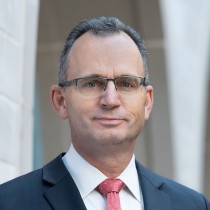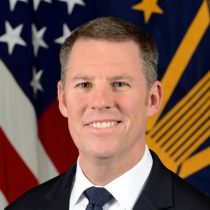Contents:
- UNGA week kicks off with a US-Iranian prisoner swap
- What Biden’s overall foreign policy philosophy means for the Middle East
- US-Bahrain security relationship: A framework for the future
- An ambassador arrives: China tangos with the Taliban in Afghanistan
- Pakistan’s military takes stage center in the country’s ongoing drama
UNGA week kicks off with a US-Iranian prisoner swap
Paul Salem
President and CEO

-
As part of a prisoner swap deal, Iran announced the release of five Americans held in Evin Prison, while the U.S. will lift charges against five Iranians and release $6 billion in frozen Iranian assets.
-
Underscoring the continuing decline of the U.N. and global governance, only the U.S. among the five permanent members of the Security Council will have its leader in New York. Reform of the Security Council is long overdue and the U.S. should lead — rather than resist — the process.
Vaguely reminiscent of the timing of Iran’s release of U.S. embassy hostages on the day of President Ronald Reagan’s inauguration in 1981, Iran announced that five Americans held in Evin Prison left Tehran at 9 a.m., New York time, today. In turn, the U.S. will lift charges against five Iranians — only two of whom have opted to return to Iran — and release $6 billion in frozen Iranian assets held in South Korea. The timing of the release will help Iranian President Ebrahim Raisi, who is coming to New York for the United Nations General Assembly (UNGA), divert attention from the anniversary of the Mahsa Amini killing and the repression of women. An interesting question is whether, like in 1979-80, the Iranians are trying to game the U.S. elections. Back then, they wanted to humiliate President Jimmy Carter; today, they would certainly prefer Joe Biden win a second term rather than see Donald Trump return to the White House. The prisoner deal is already a Republican attack line against the administration, but among Democrats and independents it might play better. The bigger question is whether Iran will build on this agreement to move back into the nuclear deal before the U.S. election season really gets underway.
Otherwise, the upcoming UNGA week seems underwhelming. Underscoring the continuing decline of the U.N. and global governance, only the U.S. among the five permanent members of the Security Council will have its leader in New York. Looking back over the last few weeks, the G20 and BRICS summits seemed almost more consequential. This should raise alarm bells in Washington, at least, that the main institution of the post-World War II global order — which the U.S. shaped and led and which have generated broad global goods as well as advantages for the U.S. — is in rapid decline. And this should spur urgent thinking about how the institution could be reshaped to be rescued. The obvious breakage is in the Security Council. Russia and China have already checked out of that institution; but what is most glaring is the grossly unfair and illegitimate allocation of permanent seats on that body. It is laughable that the small nations of France and the United Kingdom have permanent seats, while the vast nations and continents that they — and other European powers — colonized remain marginal. The U.S. says it is concerned about relations with the Global South, and indeed that is a weak point that both Russia and China are exploiting. What better way to rebuild global institutions and improve U.S.-Global South relations in the process than for Washington to lead — rather than resist — reform of the Security Council? A reformed council could envision the European Union, as a whole, maintaining a European seat; it’s beyond obvious that India should have one; and both Africa and Latin America — perhaps as collectives, like the EU — need seats as well. Short of that, the U.N. seems to be dangerously drifting toward further weakness.
As for the Middle Eastern agenda at UNGA, Iran has already stolen the limelight. Turkish President Recep Tayyip Erdoğan is visiting New York amid continued tensions with the U.S. over Sweden’s accession to the North Atlantic Treaty Organization (NATO) and a stalled F-16 deal; but he is scheduled to meet with his Greek and Israeli counterparts as part of Turkey’s efforts to rebuild its web of regional relations. Moreover, Israeli Prime Minister Benjamin Netanyahu will address the U.N. for the first time since 2018 and has secured an official meeting with President Biden. Their discussions will likely include the ongoing talks with Saudi Arabia, the internal governance crisis in Israel, and what might come after the U.S.-Iran prisoner swap.
The countries that need most urgent help are Morocco and Libya, both suffering from large-scale humanitarian disasters in which U.N. institutions need to play an important rescue and recovery role. More broadly, the population-rich, energy-poor countries of the Middle East and North Africa region, which include Morocco, Tunisia, Egypt, Jordan, Lebanon, and others, fit into the general concern of this week’s UNGA meetings focusing on the debt, finance, and growth crunches faced by much of the Global South. This is a similar focus to this year’s International Monetary Fund (IMF) and World Bank meetings, which were scheduled to be held in Marrakech in October but might have to be moved because of the earthquake there. Over the past year, much Western aid has been redirected to the crisis in Ukraine, leaving many MENA countries, as well as much of the Global South, in more dire need.
Follow on Twitter: @paul_salem
What Biden’s overall foreign policy philosophy means for the Middle East
Brian Katulis
Vice President of Policy

-
Secretary of State Blinken’s recent speech on the Biden administration’s foreign policy approach offers some indications of where the Middle East falls in the list of Washington’s priorities.
-
China loomed large, reflecting the number one concern for President Joe Biden’s foreign policy team, with the Middle East presented mostly within that global context — a reality worth keeping in mind while watching top U.S. officials’ various meetings and statements made at UNGA this week.
U.S. Secretary of State Antony Blinken’s speech at a university in Washington, D.C., last week, offered a framework for how the Biden administration views its overall foreign policy approach. Coming just a few days before the start of the annual United Nations General Assembly (UNGA) meetings, the speech also offers some indications of where the Middle East falls in the list of priorities of this administration and how the region is situated in Executive Branch officials’ thinking on the broader global landscape.
When it comes to the big picture, the main message of the speech was that America must already deal with a new international landscape. Blinken argued, “What we’re experiencing now is more than a test of the post-Cold War order. It’s the end of it.” The core of the speech thus focused on how the core assumptions of the post-Cold War era no longer hold, and Blinken set forth a neo-liberal internationalist worldview about how the United States continues to lead from a position of strength “grounded in both our humility and confidence.” He contrasted America’s approach to that of its competitors, whom he defined as authoritarians who seek regime preservation and enrichment. In painting a picture of today’s complicated world, Blinken used the intricate and perhaps not easily understood phrase “diplomatic variable geometry.”
If there was a top regional focus in the speech, it was Asia; China loomed large, reflecting the number one priority for President Joe Biden’s foreign policy team. The Middle East came up mostly within that global context, with Blinken highlighting the India-Middle East-Europe Corridor (IMEC) project, announced at the G20 summit earlier this month, and how this effort would link key countries of the world and create more markets for American workers, businesses, and investors. Also mentioned on the Middle East were the ongoing diplomatic initiatives to advance regional integration, including between Israel and Saudi Arabia, ongoing U.S-led military efforts to protect security in the Gulf and combat ISIS, as well as the mediation between Lebanon and Israel.
Blinken’s speech notably prioritized the democracy versus autocracy themes heard from time to time from the Biden administration. But he stressed that even though “fellow democracies have always been our first port of call for cooperation,” America is determined to work with any country, including those it has disagreements with, if they want to deliver for their citizens, contribute to solutions, and uphold international norms.
After delivering the speech, Blinken went back to the State Department, where he turned his attention to hard security matters: Later that same day, together with Crown Prince and Prime Minister Salman bin Hamad Al Khalifa, he signed the U.S.-Bahrain Comprehensive Security Integration and Prosperity Agreement, a deal to expand bilateral cooperation with the Gulf monarchy on several fronts.
The Biden administration has certainly stepped up its diplomatic engagement in the Middle East during the past year, but it’s keeping one eye on the broader dynamics in the world as it plots its next moves toward this critical if sometimes overlooked region. It’s useful to keep that wider context in mind while watching top U.S. officials’ various meetings and statements made at UNGA this week.
Follow on Twitter: @Katulis
US-Bahrain security relationship: A framework for the future
Mick Mulroy
Non-Resident Senior Fellow and Co-Director of the Yemen Steering Initiative

-
The U.S.-Bahraini Strategic Security and Economic Agreement recognizes a regional partner that has significantly contributed to the national security of the United States.
-
Competing against China, Russia, and other global adversaries requires improving our diplomatic, economic, intelligence, and military relationships in the Middle East, the Indo-Pacific, and beyond.
Recognizing partners that have significantly contributed to the national security of the United States is what we need to be doing, and the Strategic Security and Economic Agreement recently signed by the U.S. and Bahrain does precisely that. Bahrain hosts the United States Navy 5th Fleet and Naval Forces Central Command, both critical to U.S. Central Command’s (CENTCOM) maritime operations to keep the region safe for commercial maritime transport, including so much of the world’s energy. Hosting the U.S. military and contributing to the International Maritime Security Construct substantially promotes the region’s stability and our combined security.
As Secretary of State Antony Blinken said at the signing ceremony, on Sept. 13, “At the heart of the [U.S.-Bahrain] agreement is a shared goal: working together to build a region that is more secure, more prosperous, and that’s more connected to the world economy. We’re looking forward to using this agreement as a framework for additional countries that may wish to join us in strengthening regional stability, economic cooperation, and technological innovation.”
The most obvious next candidates for similar bilateral agreements that would follow the U.S.-Bahraini enhanced strategic partnership framework include Qatar and Kuwait. Qatar’s regional importance stems in large part from the fact that it hosts the CENTCOM forward headquarters in the Gulf, the U.S. Air Forces Central Command, as well as the 379th Air Expeditionary Wing at al-Udeid; Kuwait makes seven bases available for 13,000 U.S. Army troops and also hosts one joint U.S.-Kuwaiti military base. Outside of the Middle East region, the Philippines is another logical choice, the Southeast Asian island nation having recently agreed to host the U.S. Army at four military bases.
Competing against China, Russia, and other global adversaries requires much more than rhetoric or the White House drafting successive National Security Strategies. We need partners and allies distributed around the world to compete effectively; and that means improving our diplomatic, economic, intelligence, and military relationships in the Middle East, the Indo-Pacific, and beyond. We should make partnership classifications such as “major non-NATO ally” mean something and be more than symbolic, which, unfortunately, many with that status currently believe is the case.
It is critical that our partners know the U.S. is going to be there for the long run. Creating an enhanced major non-NATO ally category would help add more benefits to those who openly sign on to being our partner. This month’s agreement between the United States and Bahrain is a good start, and as Secretary Blinken says, it should and likely will be continued with other countries in the future.
Follow on Twitter: @MickMulroy
An ambassador arrives: China tangos with the Taliban in Afghanistan
Shanthie Mariet D'Souza
Non-Resident Scholar

-
The Taliban regime, which recently welcomed the new Chinese Ambassador Zhao Sheng, should know that Beijing’s wide-ranging assurances of economic investment are conditional.
-
It is difficult to foresee how Afghanistan can suddenly turn into a vibrant playing field for Chinese economic activity without first achieving some level of stability and massive improvement in governing capacities, which would require internal reforms in addition to meaningful engagement with regional countries as well as the West.
The Chinese government’s appointment of a new ambassador for Afghanistan on Sept. 13 has raised two pertinent questions: 1) whether the move marks Beijing’s official recognition of the Taliban, and 2) what is China’s strategic intent in Kabul. The Chinese Ministry of Foreign Affairs has sought to play down the development as “routine” and a mere replacement of its incumbent ambassador, who had spent four long years in the war-torn country. The Taliban, on the other hand, have sought to make the appointment a publicity exercise by trying to highlight it as “the beginning of a new chapter” and have advised other countries to follow suit.
At one level, Beijing’s claim is consistent with the policy it has pursued ever since the August 2021 capture of power by the Taliban. Beijing effectively welcomed the return of Taliban rule, has continued to engage with the officials of the Islamic Emirate, attempted to more seriously extend the Belt and Road Initiative (BRI) to Afghanistan, and has de facto disregarded the Taliban’s widespread human rights abuses and regressive policies against girls, women, and minorities. In essence, China sees the Taliban-ruled country as a new frontier and fertile ground for embracing Chinese anti-Americanism and its exploitative economic policies.
Although Beijing ostensibly decried the precipitous and chaotic withdrawal of the United States and allied forces and its officials regularly bemoan the lack of Western interest in Afghanistan, that reality actually suits its strategic objectives and policies. The Taliban’s incapacity to govern and severe shortage of operational funds have turned Afghanistan into a candidate much more willing to sign on any dotted lines dictated by Beijing. This helps explain why the Taliban — otherwise strict adherents of fundamentalist Islam — have turned a blind eye to the plight of the persecuted Muslim Uyghurs at the hands of the Chinese government.
Yet the Taliban , notwithstanding the high publicity stunt with which they welcomed the new Chinese Ambassador Zhao Sheng, should know that Beijing’s wide-ranging assurances of economic investment are conditional. It would require great efforts on the part of the Islamic Emirate to turn China’s pledges into actual investment and Chinese promises into real help on the ground. It is difficult to foresee how the country can suddenly turn into a vibrant playing field for Chinese investment and economic activity without first achieving some level of stability and massive improvement in governing capacities. In turn, accomplishing those would require internal reforms and meaningful engagement with regional countries as well as the West. The road ahead for China in Afghanistan is certainly not bereft of hurdles, and its tango with the Taliban comes with a price some others have already paid in their previous interventions in Afghanistan.
Follow on Twitter: @shanmariet
Pakistan’s military takes stage center in the country’s ongoing drama
Marvin G. Weinbaum
Director, Afghanistan and Pakistan Studies

-
Since the ousting of Prime Minister Imran Khan in April 2022, the military establishment has moved from informal and covert involvement to a more direct and prominent role in shaping and supervising both domestic and foreign affairs.
-
Short of a serious breakdown of domestic order, the military is likely to resist assuming full responsibility for governing, as the senior brass is not anxious to be saddled with the storm of crises with which Pakistan is currently coping.
Pakistan is well accustomed to the military playing a prominent role in the country’s governance. At its fullest, the military establishment has exercised direct control over all instruments of government. But for the last 15 years, its persuasive influence has been used more to look like a partnership with elected governments. This practice of hybrid government drew particular attention during the Imran Khan administration. But the partnership terminated with the prime minister’s ousting in April 2022, and the military establishment has moved from informal and covert involvement to a more direct and prominent role in shaping and supervising both domestic and foreign affairs. It was plainly in evidence during the 16-month term of office of the Shehbaz Sharif government and has become even more so with its successor, the pre-election caretaker government headed by Anwaar-ul-Haq Kakar. This can be witnessed in a series of recent developments.
To begin, the appointment of interim Prime Minister Kakar and his 26-member cabinet ensures the military a commanding voice in the government. The majority of cabinet members have held positions in the government during the previous two hybrid regimes and have a track record of service to the military establishment. Kakar’s close ties with it have been a consistent feature throughout his career. He has been a faculty member at several esteemed military-run educational institutions and was viewed as having toed the military’s line on security and human rights issues through his association with the Baloch National Party and his own military-funded non-governmental organization, Voice of Balochistan, before entering politics as a senator.
Second, the military has effectively pushed aside the civilian officials in the economic sphere. Anxious to right the country’s badly listing economy, Army Chief Asim Munir has created task forces to deal more vigorously with combating smuggling, the illicit foreign exchange black market, and electricity theft, and he has promised to hold corrupt politicians accountable for the economic downturn. The general has worked to strengthen the rupee’s exchange rate and has largely taken over the government’s economic diplomacy. Munir hopes to secure as much as $100 billion in investment over the next three to five years from friendly Gulf states. His efforts are also meant to restore the public’s faith in the military establishment.
Third, charged with conducting the next election, the interim government takes its cues from the military, which above all aims to ensure that the still popular Khan never again gets a chance to compete. With courts having been generally sympathetic toward the former prime minister, the recent retirement of former Chief Justice Umar Ata Bandial has probably given the establishment a more pliant justice in his successor, Qazi Faez Isa. But if the courts continue to pose an obstacle, Kakar’s interim government can be expected to maneuver to ignore or bypass its decisions. Whatever the date set for Pakistan’s upcoming national election, the military establishment will use every means to ensure that those political parties aligned with its objectives are able to secure a majority in the National Assembly.
Fourth, the military has always felt that it owns an exclusive right to set the country’s foreign and security policies. Among the reasons for its turning against Khan were his coddling of the militant group Tehreek-e Taliban Pakistan and his sharp verbal attacks accusing the U.S. of conspiring against his government. No prime minister can now be expected to get as far as Khan did acting independently in the realm of foreign and security policy.
Short of a serious breakdown of domestic order, the military is likely to resist assuming full responsibility for governing. These governments have always ended badly for Pakistan and for the military as an institution. Its senior brass is not anxious to be saddled with the storm of crises with which Pakistan is currently coping. Even as the military now more transparently flexes its political muscle, it would prefer to have an elected government seen as accountable for unavoidably unpopular policies.
Research assistant Naad-e-Ali Sulehria contributed to this piece.
Follow on Twitter: @mgweinbaum
Photo by KARIM JAAFAR/AFP via Getty Images
The Middle East Institute (MEI) is an independent, non-partisan, non-for-profit, educational organization. It does not engage in advocacy and its scholars’ opinions are their own. MEI welcomes financial donations, but retains sole editorial control over its work and its publications reflect only the authors’ views. For a listing of MEI donors, please click here.













